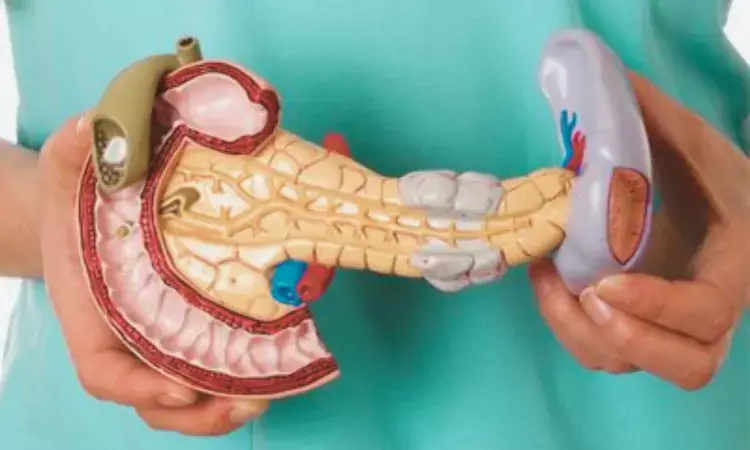- Home
- Medical news & Guidelines
- Anesthesiology
- Cardiology and CTVS
- Critical Care
- Dentistry
- Dermatology
- Diabetes and Endocrinology
- ENT
- Gastroenterology
- Medicine
- Nephrology
- Neurology
- Obstretics-Gynaecology
- Oncology
- Ophthalmology
- Orthopaedics
- Pediatrics-Neonatology
- Psychiatry
- Pulmonology
- Radiology
- Surgery
- Urology
- Laboratory Medicine
- Diet
- Nursing
- Paramedical
- Physiotherapy
- Health news
- Fact Check
- Bone Health Fact Check
- Brain Health Fact Check
- Cancer Related Fact Check
- Child Care Fact Check
- Dental and oral health fact check
- Diabetes and metabolic health fact check
- Diet and Nutrition Fact Check
- Eye and ENT Care Fact Check
- Fitness fact check
- Gut health fact check
- Heart health fact check
- Kidney health fact check
- Medical education fact check
- Men's health fact check
- Respiratory fact check
- Skin and hair care fact check
- Vaccine and Immunization fact check
- Women's health fact check
- AYUSH
- State News
- Andaman and Nicobar Islands
- Andhra Pradesh
- Arunachal Pradesh
- Assam
- Bihar
- Chandigarh
- Chattisgarh
- Dadra and Nagar Haveli
- Daman and Diu
- Delhi
- Goa
- Gujarat
- Haryana
- Himachal Pradesh
- Jammu & Kashmir
- Jharkhand
- Karnataka
- Kerala
- Ladakh
- Lakshadweep
- Madhya Pradesh
- Maharashtra
- Manipur
- Meghalaya
- Mizoram
- Nagaland
- Odisha
- Puducherry
- Punjab
- Rajasthan
- Sikkim
- Tamil Nadu
- Telangana
- Tripura
- Uttar Pradesh
- Uttrakhand
- West Bengal
- Medical Education
- Industry
Faecal Elastase-1 Test May Help Diagnose Pancreatic Exocrine Insufficiency After Pancreatic Resection: Study

Italy: Pancreatic exocrine insufficiency (PEI) is a common yet often underrecognized consequence of pancreatic resection. A recent systematic review underlines the limitations in current diagnostic approaches and highlights the need for standardized assessment and treatment strategies for post-pancreatectomy PEI.
In the research published in BMC Surgery, fecal elastase-1 (FE-1) test emerged as the most frequently utilized diagnostic tool for detecting pancreatic exocrine insufficiency following pancreatic surgery. However, the review indicates a lack of well-structured comparative studies evaluating the diagnostic accuracy of various available tests. The researchers acknowledge the gap in research that emphasizes the necessity of identifying the most reliable method for diagnosing and assessing the severity of PEI in post-surgical patients.
Pancreatic exocrine insufficiency is characterized by diminished pancreatic exocrine function, leading to impaired digestion and nutrient absorption. While clinical guidelines offer recommendations for diagnosing PEI following pancreatic resection, achieving an accurate diagnosis remains challenging in routine practice. Marcello Di Martino, Department of Health Sciences, University of Piemonte Orientale, Novara, Italy, and colleagues comprehensively evaluate the methodologies and diagnostic accuracy of available tools for assessing PEI after pancreatic surgery, highlighting existing gaps and the need for standardized approaches.
For this purpose, the researchers reviewed PEI diagnostic tests using a combined text and MeSH search strategy to identify relevant articles on post-pancreatectomy PEI diagnosis.
Key Findings:
- The literature search identified 4,874 records, of which 30 studies with 2,305 patients were included in the analysis.
- The reported incidence of PEI varied widely across studies, though more than two-thirds of the included papers indicated a prevalence exceeding 65% in patients who underwent pancreatoduodenectomy or distal pancreatectomy.
- The fecal elastase-1 (FE-1) test was the most commonly used diagnostic tool for post-pancreatectomy PEI.
- Six studies compared the diagnostic accuracy of FE-1 with fecal fat tests or 13C breath tests, finding no significant differences.
- Five studies examined micronutrient deficiencies in patients with post-pancreatectomy PEI.
The researchers state that post-pancreatectomy PEI remains a significant health concern, with challenges in accurate diagnosis and comprehensive patient assessment. The fecal elastase-1 test was the most commonly used diagnostic tool; however, well-structured studies comparing its accuracy with other diagnostic methods are limited. Research on key aspects such as micronutrient deficiencies, anthropometric variations, weight recovery time, and patient-reported outcomes is also scarce.
"Moving forward, establishing a gold standard for diagnosing and assessing the severity of post-pancreatectomy PEI is crucial. Additionally, future studies should focus on evaluating risk factors across different patient groups and developing tailored pancreatic enzyme replacement therapy strategies to optimize patient care," they concluded.
Reference:
Di Martino, M., de la Hoz Rodriguez, Á., Saibanti, A. et al. Pancreatic exocrine insufficiency after pancreatic resection: a systematic review. BMC Surg 25, 53 (2025). https://doi.org/10.1186/s12893-025-02787-y
Dr Kamal Kant Kohli-MBBS, DTCD- a chest specialist with more than 30 years of practice and a flair for writing clinical articles, Dr Kamal Kant Kohli joined Medical Dialogues as a Chief Editor of Medical News. Besides writing articles, as an editor, he proofreads and verifies all the medical content published on Medical Dialogues including those coming from journals, studies,medical conferences,guidelines etc. Email: drkohli@medicaldialogues.in. Contact no. 011-43720751


